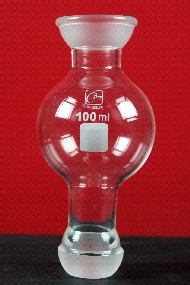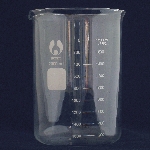CTECH Glassware Technical Information
All our heating apparatus such as beakers, conical flasks, crystallizing dishes, round bottom flasks and adapters listed in our product range are manufactured from borosilicate glass 3.3. A large proportion of our measuring equipment is also made from borosilicate glass. Borosilicate glass is internationally recognized as the premium raw material for laboratory grade glassware selected due to its physical and chemical characteristics as described below:
Technical data of CTECH® Glassware:
1. Composition

2. Physical Properties
Glass type: Hard Borosilicate Glass Linear.
3. Temperature Resistance
Thermal resistance is a good gauge to how well the glass handles high heat and yet retains its shape and structural integrity. Factors that should be specially considered are softening temperature and coefficient of heat. Our borosilicate glass has high softening temperatures and low coefficient of heat enabling our glassware to withstand heat and also have a higher range of working temperatures. Special care must still be taken at temperatures above 1400oC to heating and cooling to be done in a most uniform manner.
4. Chemical Resistance
Borosilicate glass has a very high resistance to attack from water, acids, salt solutions, halogens and organic solvents. Only concentrated phosphoric acid and strong alkaline solution cause significant corrosion of the glass.
Chemical Resistance to effect of:
6. Acid resistance
Our borosilicate glass has been shown to have high acid resistance due to the high silica content, meeting the requirement of being type 1 glass.
7. Pressure resistance
Glass being a brittle material is easily damaged by compressive or expansive forces. The presence of faults or imperfections during the glassblowing process would produce weak points in the glass for cracks to initiate. Our products for pressure or vaccum use have additional safety factor considerations in addition to the stated condition.
8. Optical Data
Our borosilicate glass allows light transmission in the visible spectrum to nearing UV spectrum. It is suitable for most general laboratory use.
Technical data of CTECH® Glassware:
1. Composition

| SiO2 | 80.4% |
| AI2O3 | 2.4% |
| B2O3 | 13.0% |
| Na2O | 4.2% |
2. Physical Properties
Glass type: Hard Borosilicate Glass Linear.
| Coefficient of expansion (20oC - 300oC) | 3.3x10-6K |
| Annealing point | 560±10oC |
| Density, Annealed | 2.23g/cm3 |
| Softening point | 820±10oC |
| Hydrolytic resistance | Type 1 glass |
| Acid resistance | Type 1 glass |
| Alkali resistance | Type 1 glass |
3. Temperature Resistance
Thermal resistance is a good gauge to how well the glass handles high heat and yet retains its shape and structural integrity. Factors that should be specially considered are softening temperature and coefficient of heat. Our borosilicate glass has high softening temperatures and low coefficient of heat enabling our glassware to withstand heat and also have a higher range of working temperatures. Special care must still be taken at temperatures above 1400oC to heating and cooling to be done in a most uniform manner.
4. Chemical Resistance
Borosilicate glass has a very high resistance to attack from water, acids, salt solutions, halogens and organic solvents. Only concentrated phosphoric acid and strong alkaline solution cause significant corrosion of the glass.
Chemical Resistance to effect of:
| Conditions | Standard | Class |
|---|---|---|
| Water at 98 | ISO 719 | HGB1 |
| Water at 121 | ISO 720 | HGA1 |
| Acid | ISO 1776 | HGA1 |
| Boiling water solution of alkali | ISO 695 | HGA2 |
6. Acid resistance
Our borosilicate glass has been shown to have high acid resistance due to the high silica content, meeting the requirement of being type 1 glass.
7. Pressure resistance
Glass being a brittle material is easily damaged by compressive or expansive forces. The presence of faults or imperfections during the glassblowing process would produce weak points in the glass for cracks to initiate. Our products for pressure or vaccum use have additional safety factor considerations in addition to the stated condition.
8. Optical Data
Our borosilicate glass allows light transmission in the visible spectrum to nearing UV spectrum. It is suitable for most general laboratory use.

